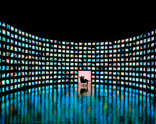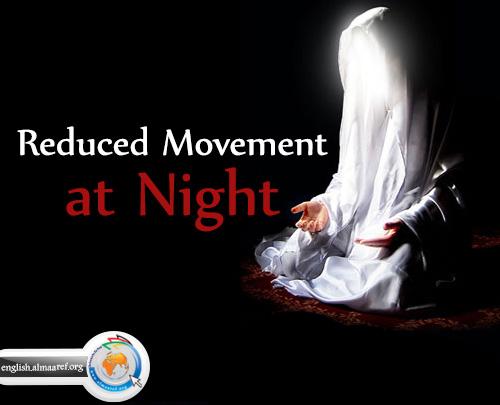Warm-up
Audio-Visual media are the most influential means of communication; it is easier for audience to be listening or watching rather than reading. There are hardly inhabited places without one of these two sets of communication, (Radio or TV) or both of them. We have to make good use of their presence as means to reach public intellectual frame through well-set and purposeful strategies without any absurdity, abuse, or low-standard entertainment so that public basics and values will be kept reserved. Imam Ali al-Khameini, May Allah reserve him, expresses his views concerning these two media in particular:
“Generally speaking, and as the late Imam Rouhu Allah al-Mousawai al-Khomeini, May Allah bless him, has said: Radio and TV should be playing an inclusive informing role spreading ethics, religion and Islamic values; educating about the best life style; and updating the latest general ideas and political trends. All of this should be delivered in eloquent and comprehensible language that target different capabilities of both the elite and average public, as well.”1
Audio-Visual Media General Policy
In his meeting with experts in media, as for example, the president and the managers of the Radio and Television Foundation, Imam Ali al Khameini draws their attention to some detailed observations and improving suggestions to help developing media performance and let these structures be on the right Islamic track. Such observation is a result of his careful following of public, governmental and media related matters. In fact, being an adequate follower is one of his qualities.
“Among the most crucial points that should be of your concern while drawing the general strategy and policy of the new administration of the Radio-TV Foundation are:
1- Determining a definite track of the movement of this foundation. This track is supposed to lead the foundation to achieve excellence in quality rather than in quantity. Excellent and qualified programs are much more important than any expansion in quantity, which comes of second importance at the right moment. Today, media coverage should reach all villages and rural areas. This expansion in coverage should be a priority, now.
2- The entire media system should be checked once again to make necessary modifications and improvements that would lead into having more qualified productions and styles of presentation.
3- You should take good advantage of academic views and research already available; in the meantime that further scientific and social research. Emphasis should be placed on establishing new Islamic research in depth and at highly professional level- any other weak or personal views, which might be mixed with illusions or superstitions, should be avoided. However, this is only achievable through serious coordination between Islamic Scientific schools [al-Hawzah] and Islamic scholars.
4- Communication systems should be improved to fasten the process of delivering information. Besides that, the language of media should be always eloquent and clear. These are the most important tasks of media, today.
5- More attractive and creative elements should be added to Radio-TV programs. In addition to that, contents should be conveying purposeful ethical, social and political messages and presented in the most qualified shots. Any other misleading, low-standard or worthless views must be omitted.
6- Concerning broadcasting music, there are two types of music, one of which is allowed according to Islamic standards and thus choices should be among this permissible type; while the other type, which is forbidden for being playful and of low-standard, must be avoided.
7- World’s arrogant foreign cultural, informing, and news attack must be always confronted. Such confrontation could not be only achieved through newscasts, but it should rather be available through the entire Radio-TV programs, the other scientific, social and political reports as well as the various cultural and entertaining acting dramas.
8- All media workers should be aware of the real influence of this foreign attack. Its greater influence is leaked through advertisement rather than direct talk shows. This influence must be confronted now by all smart and reasonable ways2.
Audio-Visual Media Ethics
Human ethics, which are the basics of religion, must be- according to Imam Ali al- Khameini- always presented as a priority in media purposeful propaganda.
“The ethical identity of a society is its real identity as it is the central issue whereas any other issues are of secondary importance and revolving around this center. Ethics must be of a prioritized concern. Radios and TVs must set plans to spread merits in society; they must clarify them in details and one by one including social individual attitude and discipline, social etiquette, family care, reserving others’ rights and human dignity, common sense, self-dependence, personal and national courage, organization, planning, and satisfaction- which is first ranked merit in a society. The ethical crises encountered nowadays are due to becoming no more aware of natural and instinctive merits, fidelity, piety; no more supporting righteousness, or seeking both internal and external beauty; not avoiding consuming; not choosing chastity, or showing respect to parents and teachers.
These are our merits and Radios and TVs should bear full responsibility in getting them widely spread through tackling them in programs, episodes, talk shows, and reports. You, as media workers and producers, have to behave according to these merits while you are making a phone call even. These merits must never be contradicted or lost.”
Media, Public Religious Commitment
According to Imam Ali al-Khameini, the relation between media and public religious commitment is greatly connected; he contributes the task of upgrading public’s religious knowledge and faith to media. He insists that media should make sure that as they present a debate or doubts about certain Islamic values or beliefs, reasonable solutions should be presented in parallel, too, to avoid getting any of these doubts stuck in public minds due to media’s failure in presenting reasonable solutions.
“What is the role of Radios and TVs concerning people’s religion? What responsibilities should they undertake? There’s a difference between religious knowledge and religious faith, but both of them must be always enforced- and this is the duty of media. Great attention must be paid for not weakening public religious faith or make it shallow or superficial. Don’t rely on excessive emotions as this tactic is fruitless in spreading religious knowledge. Thus, all of your activities must be based upon these guidelines. And now, let’s tackle our main subject about Radio-TV programs in order to be aware of what to do or to avoid; religious programs don’t have only to avoid magnifying or stirring doubts but also to remove all of them. Discussing doubts in the presence of highly faithful group of people may enforce the faith of every member of such a group; but tackling these doubts on air among millions of listeners and viewers may shake the faith of some of them. So discussing doubts on public must be avoided. Getting rid of doubts should be the starting ground of religious talking, which has to be clear, well-expressed, creative and based on correct information because junior learners of Islamic knowledge should be receiving correct information from the beginning. Pupils in elementary classes receive correct information about mathematics, and their knowledge gradually expands based on this correct knowledge; one plus one equals to two, and two plus two equals to four- this is a fact no matter in which mathematical class they are. That’s why any false information about religion may shake the entire credibility of religion upon realizing truth in later stages; thus, even juniors or ordinary people should be receiving correct knowledge about religion from the beginning.”3
Media and Entertainment
Educational and moral guidance should be always associating media programs especially those categorized as entertainment or contests; Imam Ali al-Khameini sees entertainment as a necessary element in media productions but producers should always avoid producing profligate, clowning, vague or guideless contents or rewarding viewer or listener competitors for worthless reasons.
“Drawing a smile on others’ faces is extremely important; life is unbearable without smiles. Imam Ali Bin Abi Talib, Peace be upon him, says: ‘The cheerfulness of a faithful man is on his face.’ If you can help make your society cheerful, go on, and do it, but let it be well-produced. I don’t mean that your style has not been well-planned; on the contrary, I want to insist that you are on the track, and that you have to peruse. But be careful not to mix between making public laugh and between indecency or profligacy. You should rely on correct means to make public laugh. Jokes or witty comments may drive audience to laugh; but profligate expressions consume utmost but superficial effort to snatch a laugh from audience. The skill of making others laugh is a remarkable art in itself; it helps in demonstrating serious affairs in irony style. Contests come as a part of entertaining programs; they are good but much attention should be paid for their harmful impacts on wording and practice levels, and even on forming unnecessary laughter. Sometimes competitors in contest-based programs, like call-in shows, are given rewards for nothing. One caller has got five million Toman just because he answered some simple questions. His reward was worth the sum of three-year salaries. Some would say that these contests and rewards are educational promotions. Well, this is a harmful and unreasonable way; add to that, its benefits are abused! It is unnecessary to know whether the Bible is written in Arabic, Latin, or Greek. Such knowledge does not deserve a million Toman! Knowledge should be promoted in another way. All details including the sense of humor, elements, advantages and disadvantages must be taking into consideration while producing entertaining materials.”4
Censorship
Censorship is among the top tasks that should be practically borne by Radio-TV media. Actually, it presents an obstacle in front of the flow of immorality in media. It also controls boundaries set by Islamic principles related to journalism. Imam Ali al-Khameini insists on several points here. Firstly, the role of censorship should not be limited by introducing the Islamic principles related to journalism. Secondly, censorship is a filter of all ideas to be broadcast for they may leak into the minds of the public in an indirect way. Thirdly, censorship should be put into practice from the beginning to facilitate any modifications before reaching post production stages.
“Among your executive tasks is studying the content of any material along with the way it is going to be presented ahead of its production; you should carefully observe how far Islamic principles are actually practiced on daily work basis as to keep the legal distance between a man and a woman while acting, or to separate between them as they are sitting on the same sofa. In addition to that, you should study carefully the content of any material before handing it to the producer and while being undergoing its production stage, you should be on spot for an immediate treatment in order to avoid wasting money or re-modifications in late stages and to avoid any undesirable comments, as well.”5
Harmonized Language
Imam Ali al-Khameini insists that media experts should avoid broadcasting any contradictory concepts that might lead to destabilize the values that are desired to be hold by the public. To him, presenting a film that tackles the issue of revenge in the broadcast period that focuses entirely on pardon and forgiveness is a big mistake. Any contradictory language would only mark time instead of presenting something worthy to public.
“Media messages must be presented with great coordination and successive flow. Presenting bits from here and there leads to nowhere. It is necessary to prepare materials to be presented in a way that each supports the other in order to be able to get their messages deeply rooted in society. Most of drama episodes seem to have been shot in luxurious palaces. Why? Is the majority of the nation living in palaces? Practically, you are broadcasting scenes taken in palaces; while theoretically you are speaking about ‘social justice’?!!! Is it necessary to shoot in such places? Comparing drama in ancient time and today, actually although the ancient drama production has not been as qualified as today, but it has been closer to reality as it shows people living in their modest houses- that is the very correct doing! There’s no need to introduce life as if it is so luxurious. In addition to that, there’s also a contradictory between broadcasting advertisements that promote consuming; while you have voted for the electoral campaign that criticizes and condemns consumption.
Purposeful Content
All what has been already mentioned about the relation between media and the general public religious commitment and morality as well as making use of entertainment programs leads to one conclusive suggestion- the need of displaying purposeful content through audio and visual means. Some may mistakenly think that having well-guided programs in media would create boredom among audience. The question now is how to harmonize between the two requirements- [having well-guided programs in addition to reserve the interest of the audience]?
Well, Imam Ali al-Khameini, May Allah reserve him, gives his wise instructions to solve the issue as saying:
“You have to oblige the study of the content of any material before producing it. Every material has to have a message and be expressed in a clear language. Well, that does not mean that they have to be boring. Messages could be embedded even in entertainment programs.”6
Imam al-Khameini presents the following models exemplifying the purposeful broadcasting:
“A shot presenting a few old men joining ‘the collective prayer’ will not serve in promoting this holy prayer! In addition to that, being only satisfied by broadcasting ‘the call to prayer’ is insufficient either! Our youths are filling the rows of ‘the collective prayers’ that are held everywhere all across our land; they are thousands in number full of enthusiasm and concentration. Many of our youths whose stories are tackled in drama films are actually among these young prayers who keep reciting supplications to Almighty Allah. The overwhelming state of faith and worship will certainly move on and shake throats inside upon listening to ‘the call to prayer’ as it is due! What a spiritual anthem ‘the call to prayer’ is! Right away listening to ‘the call to prayer’ many people halt their daily work and head toward mosques in large groups joining ‘the collective payer’! Media can serve in promoting this rescuing dutiful prayer by broadcasting all of these scenes that are capable of portraying ‘the collective prayer’ so brilliantly!”
Indirect Influence
The desirable influence of well studied content should not be stated explicitly as by lecturing people about what to do or halt doing; for this is definitely fruitless. These desirable messages should be implicitly embedded. There are many modern ways that can help achieving preferred results. Imam al-Khameini says:
“I’ve repeatedly mentioned that concepts should be conveyed indirectly; foreign films sometimes present their cultural and even religious messages in a way that makes them hardly felt; art always aims at expressing what human beings want in a wonderful style and with utmost influence without letting audience feel annoyed.”7
Figures in Media
Media should carefully choose the figures they host. People in media are feared to becoming soon models for average people and youths. Imam Ali al-Khameini insists that media should shift their focus from silly people.
“You should pay attention not to focus the light of fame on bad people. I’ve watched and listened to some programs wasting public funds as they are shedding light on some people, who even lack scientific and professional credibility. Why? Give me reasons.
I sometimes watch some people unqualified in their professions or even considered as on average, yet they are given about one or two broadcasting hours presenting their profile, family background and silly history. Why?
Moreover, by introducing these personalities, media are, in fact, creating and introducing models to the public. Do we really want to create this kind of models for youths?!”8
* Media. "Chapter 2". Edited by: Nūn for translation and writing center. Published: June 2010. www.almaaref.org
1- Speaking in a meeting with the president and the managers of the Radio and Television Foundation.
2- Same event footnoted 12.
3- Same event footnoted 12
4- Same event footnoted 12.
5- Same event footnoted 12.
6- The Annual meeting of establishing prayer, Jamadi the second, 29, 1423 Hegira, Karman.
7- Quoted as speaking in the same event footnoted 12.
8- Quoted as speaking in the same event footnoted 12.




















